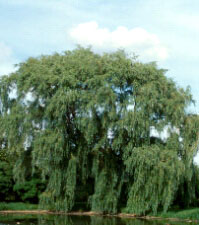Naturopathic health
White Willow Herbal Remedy
|
Benefits of White Willow Bark Salix Alba White willow bark information White Willow is used by herbal practitioners in the treatment of rheumatism and arthritis. White willow can be used for: Arthritis Rheumatism Reducing inflammation and pain Rheumatoid arthritis Ankylosing spondilitis Reducing fevers Precautions White willow contains salicylates so should be avoided in patients with known sensitivity to aspirin and iboprofen type products Active compounds Phenolic glycosides, flavonoids, tannins What herbal practitioners say about White willow White willow is used to
relieve inflammation and pain caused by conditions such as arthritis and
rheumatism, especially in cases where the symptoms are made worse by cold and
damp weather. It helps to reduce
connective tissue inflammation as suffered in rheumatoid arthritis and can be
used for lower back pain. White willow
can also be used in the treatment of fevers.
Tincture dose Adult dose: 1.5 - 3mls three times a day. Children’s dose: 0.8 – 1.1mls three times a day. Based on a ratio of fresh herb to alcohol of 1:2 Naturopaths treat the whole person not just the disease or condition. That's why you cannot use this site for diagnosis or treatment. The information we provide should not be treated as a substitute for medical advice or treatment. We recommend that you visit a qualified naturopath or find a GP who is sympathetic to a naturopathic approach. Click here for our full disclaimer. |
Research homeHerbal remediesAdvice on buying herbal remedies
|
|
|
|
|
|
|
|
||
|
|
|
If your starting to move towards a healthy diet and you want to take a major step forward then a detoxification programme can make a big difference. Click on the link below to find out more. Healthy Recipes Juicing SupplementsBach Flower Herbal Acupuncture Homeopathy DetoxificationMassage Qi Gong Nutrition & Diet Iridology Tissue Salts |








